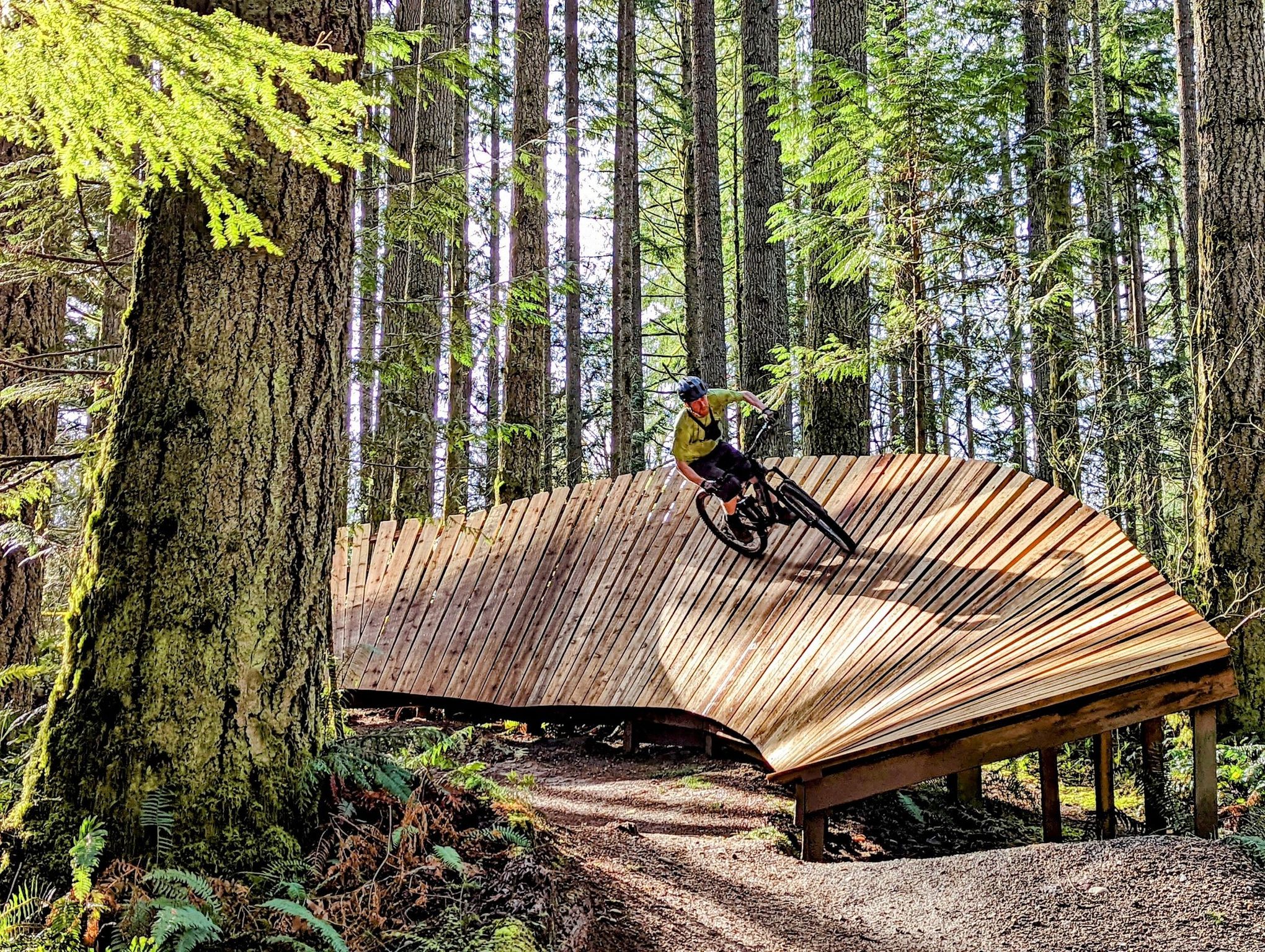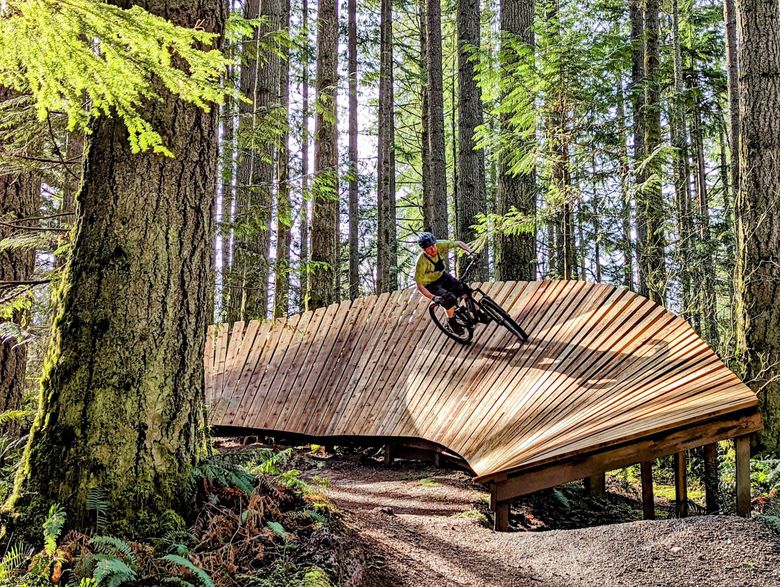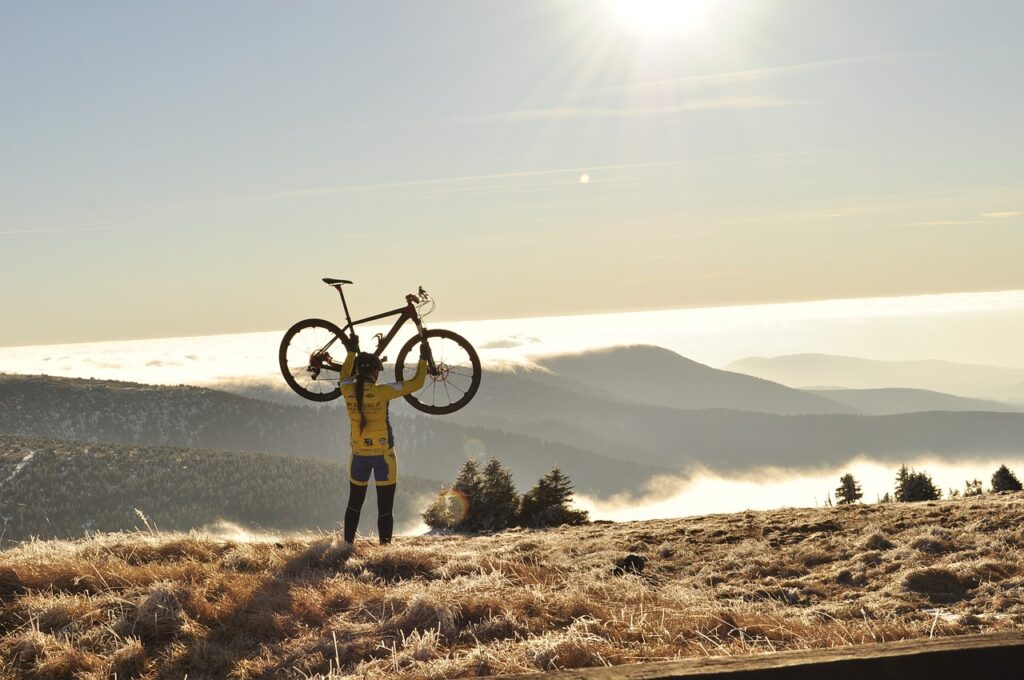To find mountain bike trails near you, use trail-finding apps or websites for local options. Look for trail difficulty and user ratings to find the best match for your skill level and preferences.
Dust off your helmet, pump your tires, and get ready for an epic ride! We all know the feeling – the itch to hit the trails and shred some singletrack. But with so many options out there, how do you find the perfect mountain bike adventure near you? Fear not, fellow riders! This guide will make finding your next off-road odyssey a breeze.
We’ll cover everything you need to know on How to Find Mountain Bike Trails near Me, including the Best local mountain biking routes and the hottest Nearby MTB trails. Let’s get you rolling on the best paths for your two-wheeled thrills!
Researching Local Trails
When it comes to researching local trails, finding the best mountain bike routes near your area can be an exciting and rewarding process. By delving into online trail databases and connecting with local mountain biking groups, you can uncover a wealth of information on nearby trails that will satisfy your thirst for adventure on two wheels.
Online Trail Databases
Online trail databases are valuable resources for discovering new trails and routes. Websites like Trailforks and MTB Project provide comprehensive databases of mountain bike trails from all over the world. Simply enter your location and explore the interactive maps, ratings, and user reviews to find the perfect trail for your skill level and preferences.
Local Mountain Biking Groups
If you’re looking to connect with the local mountain biking community, joining local mountain biking groups can provide invaluable insights into the best trails in your area. Websites like Meetup and Facebook are great platforms to find and join groups of like-minded riders who can share their knowledge and experiences with you.
Utilizing Apps And Websites
When it comes to finding mountain bike trails near you, utilizing apps and websites can be a game-changer. These platforms provide detailed information about trails in your area, so you can easily discover new routes and plan your next adventure. Here are two popular options worth checking out:
Trailforks
Trailforks is a fantastic resource for mountain bikers looking to explore new trails. This app and website offer a vast database of trails worldwide, making it easy to find options near your location. With Trailforks, you can search for trails based on difficulty level, length, elevation gain, and more. These details ensure that you choose a trail suited to your experience and preferences.
One of the standout features of Trailforks is the user-generated content. Mountain bikers can contribute to the database by adding and updating trail information. This means that the platform is continually growing and evolving with accurate details provided by fellow riders.
Mtb Project
Another useful app and website for locating mountain bike trails is MTB Project. This platform offers a comprehensive collection of trails across the United States. Whether you’re a beginner or an experienced rider, MTB Project allows you to find trails suitable for your skill level.
In addition to giving you detailed trail descriptions and interactive maps, MTB Project also includes user reviews and ratings. These insights provide valuable information from fellow mountain bikers, ensuring you have a better understanding of what to expect before hitting the trail.
Strava
If you enjoy tracking your rides and competing with others, Strava is an excellent choice. While not specifically designed for finding trails, this app has a vast user base, including many avid mountain bikers. As a result, Strava can be a valuable resource for discovering popular trails and segments recommended by fellow riders.
By browsing through the “Segment Explore” feature on Strava, you can filter by activity type and location to find mountain bike trails near you. This way, you can take advantage of the app’s social aspect while exploring new adventures on your bike.
Alltrails
AllTrails is a versatile platform that caters to a wide range of outdoor enthusiasts. While it focuses on hiking trails, it also includes many mountain bike routes. With AllTrails, you can filter trails by difficulty, length, ratings, and user reviews, allowing you to find the perfect mountain bike trail for your skill level and preferences.
The app provides detailed information about each trail, including elevation profiles and user-generated photos. This gives you a clear idea of what to expect before you head out on your mountain biking excursion.
Exploring National Parks And Forests
When it comes to locating mountain bike trails, exploring national parks and forests is a fantastic option. These protected areas often offer some of the most picturesque and thrilling trails for mountain bikers. Here’s how you can discover and enjoy these natural wonders on two wheels.
Finding Trails In Protected Areas
National parks and forests are ideal destinations for mountain biking enthusiasts. With a plethora of trails catering to different skill levels and terrains, these protected areas offer a diverse and rewarding riding experience. Many national parks provide detailed trail maps on their official websites, allowing you to plan your biking adventures. Additionally, visitor centers within national parks often have firsthand knowledge of the best biking trails and can provide valuable recommendations.
Permits And Regulations
When venturing into national parks and forests for mountain biking, it’s important to be aware of any permits or regulations that may apply. Some parks require visitors to obtain a biking permit, which helps in regulating traffic and preserving the ecosystem. Familiarize yourself with the rules and regulations specific to the area you plan to explore to ensure a seamless and respectful biking experience. By adhering to these guidelines, you contribute to the preservation and sustainability of these natural environments.

Credit: www.traillink.com
Visiting Bike Shops And Rentals
When it comes to finding the best mountain bike trails near you, there’s one resource you shouldn’t overlook: your local bike shops. These experts can provide you with valuable insight to ensure an amazing biking experience. In addition, if you don’t have your bike, renting one from a bike shop is a great option to explore new trails. Let’s dive deeper into these two options to help you get started on your mountain biking adventure!
Local Insight From Bike Shops
If you’re new to the area or simply looking to discover hidden gems, seeking local insight from bike shops is key. Bike shops are staffed with passionate individuals who know the ins and outs of the local trail network. They can offer valuable advice on which trails are suitable for your skill level and preferences, ensuring you have the best possible experience. Whether you’re a beginner seeking gentle terrain or an expert seeking a challenging ride, bike shops provide personalized recommendations tailored to your specific needs.
Additionally, bike shops often have up-to-date information regarding trail conditions, closures, and any potential hazards you should be aware of. This local knowledge is invaluable in planning your ride and ensuring you’re riding in safe and optimal conditions. By tapping into the expertise of bike shop staff, you can gain a deeper understanding of the trails near you, making your mountain biking adventure even more enjoyable.
Renting Bikes For New Trails
Don’t let the absence of a mountain bike stop you from exploring new trails. Many bike shops offer rental services, allowing you to experience the joys of mountain biking without owning your bike. Renting a bike is an excellent option for beginners who want to test the waters before committing to a purchase, as well as for travelers who want to explore trails during their visit.
When renting a bike, bike shop staff can assist you in selecting the right size and type of bike for the trails you plan to ride. They’ll ensure that you have a properly fitting bike with the necessary features for a comfortable and safe ride. Most rental bikes are well-maintained and regularly serviced, so you can rest assured that you’re riding a reliable and high-quality machine.
Furthermore, renting a bike allows you to try different models and brands before making a purchase decision. This hands-on experience allows you to gauge what type of bike suits your riding style and preferences, making your future purchasing decisions more informed.
Overall, visiting bike shops and utilizing their rental services is an excellent way to kickstart your mountain biking journey. With their local insight and expertise, you’ll have access to the best trails and receive guidance on selecting the right bike for your adventure. So, head over to your local bike shop and get ready to discover the thrilling world of mountain biking!
Attending Mountain Biking Events
Immerse yourself in the exhilarating world of mountain biking events to connect with fellow riders and explore new trails.
Race Events:
Participate in thrilling mountain bike races to test your skills and push your limits.
Festivals:
Experience the vibrant atmosphere of mountain biking festivals, filled with excitement and community spirit.
Networking With Riders:
Connect with other riders both on and off the trails to share tips, and experiences, and find new biking buddies.
Following Social Media And Forums
Locating trail communities through social media and forums is a great way to connect with fellow enthusiasts and discover hidden gems nearby.
Locate Trail Communities
- Join Facebook groups or online forums dedicated to mountain biking.
- Search for local biking clubs on social media platforms like Instagram or Twitter.
- Engage with the community to get recommendations on trails in your area.
Get Real-time Trail Updates
- Follow popular biking accounts on social media for instant trail updates.
- Bookmark websites that provide live trail condition reports.
- Set up notifications for forums to stay informed about trail changes.
Safety Precautions And Gear
When it comes to hitting the mountain bike trails near you, safety should always be a top priority. Ensuring you have the right safety precautions and gear is essential for a fun and worry-free ride. Here are some crucial points to consider:
Essential Safety Gear
Riding on mountain bike trails can be exhilarating, but it also comes with inherent risks. Wearing the right safety gear can help mitigate these risks and ensure your protection. Here are some essential safety gear to consider:
- Helmet: A properly fitting helmet is non-negotiable for mountain biking. It protects your head from potential impacts and is a crucial piece of safety gear. Make sure it is ASTM or Snell-certified.
- Gloves: Quality gloves provide grip, protect your hands from blisters, and offer some level of protection in the event of a fall.
- Eye Protection: Sunglasses or goggles shield your eyes from debris and low-hanging branches, increasing your overall safety on the trail.
- Appropriate Clothing: Choose breathable, moisture-wicking clothing that offers protection from the elements without impeding your movement on the bike.
- First Aid Kit: A compact first aid kit can be a lifesaver in case of minor injuries on the trail.
Trail Difficulty Assessment
Assessing the difficulty level of mountain bike trails is imperative to ensure a safe and enjoyable ride. Understanding the trail difficulty ratings can help you prepare adequately and avoid potential hazards. Here’s what you need to know:
| Trail Rating | Description |
|---|---|
| Green (Beginner) | This level is suitable for novice riders with basic bike handling skills and minimal trail experience. |
| Blue (Intermediate) | These trails involve more obstacles and technical features, requiring moderate riding skills. |
| Black (Advanced) | Advanced trails are designed for experienced riders with excellent bike handling skills and the ability to tackle challenging terrain. |
| Double Black (Expert) | These trails are extremely technical and demanding, catering to highly skilled and fearless riders. |
By understanding these trail difficulty ratings, you can choose paths that align with your skill level, reducing the risk of accidents and injuries.

Credit: www.seattletimes.com
Maintaining Etiquette On Trails
Discover ideal mountain bike trails nearby to enjoy nature and adventure. Prioritize trail etiquette by respecting nature and fellow bikers for a harmonious outdoor experience. Follow local trail guidelines for a safe and enjoyable ride.
When it comes to mountain biking, exploring new trails near your location can be an exciting adventure. However, as responsible riders, it is important to maintain proper etiquette on the trails. By following simple guidelines, you can ensure a positive experience for both yourself and others. In this article, we will discuss two essential aspects of trail etiquette: respecting nature and others, and the principles of Leave No Trace.
Respecting Nature And Others
While out on the trails, it is crucial to have respect for the natural environment and your fellow riders. By adhering to these principles, you can help preserve the beauty of nature and maintain harmony among trail users:
- Stay on designated trails to minimize your impact on the surrounding ecosystem.
- Avoid disturbing wildlife and their habitats. Keep a safe distance and refrain from feeding or touching them.
- Show consideration towards other riders, hikers, and runners by yielding the right of way when necessary.
- Keep noise levels to a minimum to prevent disturbance to both wildlife and other trail users.
- Control your speed and ride within your ability to ensure the safety of yourself and others.
Leave No Trace Principles
One of the core principles of outdoor ethics is Leave No Trace, which emphasizes minimizing human impact on the environment. By following these Leave No Trace principles specifically tailored to mountain biking, you can contribute to the sustainability of the trails:
- Plan ahead and prepare: Familiarize yourself with the trail rules and regulations, check weather conditions, and pack essential gear and supplies.
- Travel and camp on durable surfaces: Stick to established trails and avoid riding on fragile vegetation or creating new paths.
- Dispose of waste properly: Carry out all trash, including energy bar wrappers and water bottles. Never leave any litter behind.
- Respect wildlife: Observe animals from a distance, respect their space, and refrain from approaching or disturbing them.
- Minimize campfire impacts: In areas where campfires are allowed, use designated fire rings and only burn small, dead wood. Extinguish fires completely before leaving.
- Be considerate of other visitors: Be mindful of your actions and avoid behaviors that may disrupt or inconvenience others on the trail.
- Leave what you find: Refrain from removing natural or historic artifacts from the trail. Leave everything as you found it for others to appreciate.
- Be aware of weather conditions: Check the forecast before heading out and be prepared for changing weather. Stay safe and avoid risky situations.
By adhering to these guidelines, you can do your part in protecting the natural landscape while enjoying your mountain biking adventures. Remember, responsible trail usage ensures that these trails can continue to be enjoyed by generations to come. Happy riding!
Frequently Asked Questions
Where Can I Mountain Bike In Austin Texas?
You can mountain bike at Barton Creek Greenbelt, Walnut Creek Trail, and Emma Long Metropolitan Park in Austin, Texas.
Is Austin Good For Mountain Biking?
Yes, Austin is great for mountain biking with various trails catering to all skill levels.
Does Texas Have Mountain Biking?
Yes, Texas offers mountain biking with diverse trails and terrains suitable for all levels of riders.
Where Can I Mountain Bike In NJ?
You can mountain bike in various locations across New Jersey, such as Ringwood State Park, Six Mile Run Reservoir Site, and Allamuchy Mountain State Park. These areas offer beautiful trails for both beginner and advanced riders to enjoy. Happy mountain biking in NJ!
Conclusion
Finding mountain bike trails near you can be an exciting adventure. By utilizing online resources, connecting with local biking communities, and exploring your surroundings, you can discover a variety of trails to suit your skill level and preferences. Get ready to explore and enjoy the great outdoors on a thrilling mountain biking journey.



